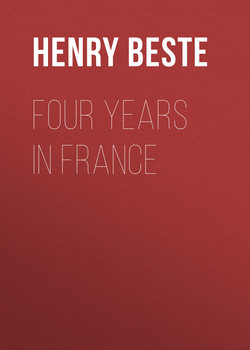Four Years in France

Реклама. ООО «ЛитРес», ИНН: 7719571260.
Оглавление
Beste Henry Digby. Four Years in France
SOME ACCOUNT, &c. &c
CHAP. I
CHAP. II
CHAP. III
CHAP. IV
CHAP. V
CHAP. VI
CHAP. VII
CHAP. VIII
CHAP. IX
CHAP. X
CHAP. XI
CHAP. XII
CHAP. XIII
CHAP. XIV
CHAP. XV
CHAP. XVI
CHAP. XVII
CHAP. XVIII
CHAP. XIX
CHAP. XX
CHAP. XXI
CHAP. XXII
CHAP. XXIII
Отрывок из книги
The English are assuredly a most enterprising and restless people: they form establishments at the Antipodes, and plant colonies on the banks of the Loire, in an enemy's country, after a war of twenty years: their merchant-vessels cover the seas, and their opulent and unoccupied gentry inundate the continent of Europe: their hardy mariners search out the north-west passage, and the idle and curious among them strive, with no less difficulty, to discover lakes, mountains, and cascades, unvisited by former adventurers,
English reading-rooms are set up at Tours and in other great towns; English seminaries of education are founded in France, Switzerland, and Italy; and English horse-races are exhibited at Naples. Fox-hunters and fox-hounds penetrate to covers where even the foxes never saw them before; where, coming from their holes, they gaze quietly upon them; where there is no sport, because no pursuit; no pursuit, because no flight; no flight, because no fear; no fear, because no experience of former enmity.
.....
Since the second restoration of the King of France, peace, and the visits of the English to the countries to which ingress is no longer prohibited, have continued without interruption: residence abroad has assumed an appearance of stability and design. An outcry has been raised in England against these emigrations, and it has been proposed to tax absentees; a measure which, in its application to those who take a journey for a few months, would be at once vexatious and ridiculous, and in its operation on those who retire abroad on account of contracted income, would be severe and unproductive; and which could, in neither case, be effected without a partial income-tax. The number of travellers and residents abroad, though great, has been much exaggerated: wherever exact inquiry has been made, it has turned out to be less than was reported. I could not hear of more than six or eight English families resident by the year in each of the three great towns of Italy, Florence, Rome, and Naples.
The French, persuaded that society can no where else be so well enjoyed as in France, feel little inclination to travel. The Italians, satisfied that all that is best worth beholding both in art and nature is to be found on their side of the Alps, seldom take the trouble of passing that barrier. I speak of the same class of persons, in both nations, as that in which the English traveller is to be found, – the rich and idle; for the poorer French and Italians are more adventurous, and more frequently leave their own country to gain their living abroad, than those of the lower condition of life in our sea-girt isle. I have therefore frequently been called upon to explain the phenomenon of the British spirit of excursion. My friends at Avignon could hardly believe that curiosity, the desire of instruction, the purpose of employing usefully a portion of time which would otherwise be employed in the ordinary routine of life, were motives sufficient for incurring the expense, trouble, and risk of long journeys: the expense, they allowed, might be a consideration of no importance to a people so rich as the English; besides, they travelled cheaper in France than in England; yet it would cost still less to stay at home: the defiance of fatigue and danger were very gravely accounted for by the supposition of something peculiar to the English character, a certain restlessness and locomotive propensity, which dislodged them from the centre of repose, and impelled them to wander in wide and extravagant orbits. The astonishment of the Avignonais was excessive, when a lady, who intended to pass some years in the south of France, coming to visit my family, and changing her purpose, returned to Paris within a fortnight. "Les Anglois font tout ce qu'ils veulent: un voyage de trois cents lieues pour une visite de quinze jours."5 Like the rustic in the fable, they waited to see the end of this current of travellers; and I could hardly obtain credit when I assured them that, though some extraordinary degree of expansion was to be expected after twenty years compression, yet when the present generation should cease, the succeeding one would still supply the stream.
.....